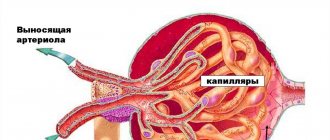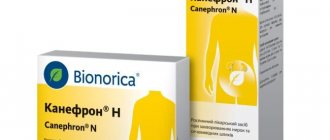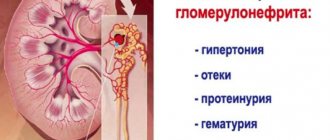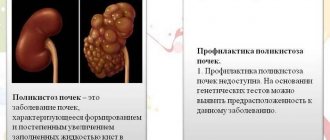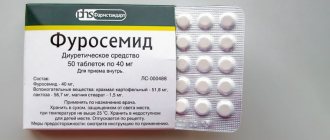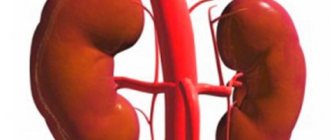For the drug Tsiprolet, the instructions for use provide detailed information regarding the indications, contraindications and features of the use of the drug for various diseases. The active component of this antibacterial agent is the substance ciprofloxacin, which effectively acts against active and dormant pathogens. A distinctive feature of the drug is maintaining the balance of intestinal and vaginal microflora. Is Tsiprolet an antibiotic?
pharmachologic effect
The most common question from patients who are prescribed the drug is: Is Tsiprolet an antibiotic or not? Which group of antibacterial drugs does it belong to?
Tsiprolet is a broad-spectrum antibiotic of the fluoroquinolone group.
Its feature is that:
- The active substances have a detrimental effect on the enzymes of pathogenic bacteria. Ciprofloxacin is able to influence both microorganisms that are in the active phase and those that are dormant.
- The active substance is quickly and almost completely absorbed and enters the blood. In plasma, its maximum concentration is reached ninety minutes after administration, and in tissues and organs - after 2 hours. Moreover, its concentration in tissues is many times higher than in the blood. When administered intravenously, the absorption of the drug and its bioavailability are significantly increased.
- The therapeutic effect of using Tsiprolet lasts up to 6 hours. Drug substances accumulate in liver cells and are excreted through the kidneys along with urine. A small amount of the drug is excreted through the stomach and along with bile. If the drug is used according to the instructions and its dose is not exceeded, then the risk of intoxication of the body is minimal, it will simply be eliminated from the body.
- The drug has antimicrobial, bactericidal and anti-inflammatory effects. It is capable of completely destroying the membrane of pathogenic cells, causing the death of the bacterium.
The dosage of the medicine depends on the patient’s age, the characteristics of his body and the specific diagnosis.
Composition and release form
For the drug Ciprolet, the instructions for use indicate that the active ingredient of the drug is ciprofloxacin hydrochloride. Thanks to the use of this component, it is possible to block the synthesis of DNA cells of pathogenic microorganisms at different stages of its development.
Tsiprolet belongs to the group of fluoroquinol antibiotics, which have a detrimental effect on a huge number of pathogenic bacteria, including E. coli, chlamydia, staphylococci, etc.
The drug Tsiprolet has several forms of release, each of which is used in different medical areas.
These drugs are available in the form:
- tablets for oral use (250 or 500 mg each);
- solution for injections (injections);
- eye drops.
The choice of the form of the drug should be made on the recommendation of a doctor.
Main rules for selecting medications
When drawing up an individual treatment regimen for acute primary pyelonephritis, the specialist is guided by several rules:
Secondary acute pyelonephritis involves surgical intervention followed by the prescription of drugs.
Therapy of chronic forms of kidney inflammation implies the following recommendations for the use of medications:
The treatment regimen for kidney inflammation in patients is selected by a specialist based on each specific case.
Indications for use
The instructions for Tsiprolet indicate that it is an antimicrobial agent that can be used to treat or prevent the development of various infections that are sensitive to its components. This drug can be prescribed alone or as a component of complex treatment. Tsiprolet can only be prescribed to adults and children by the attending physician. Self-use of the medicine can cause serious harm to the body.
The doctor will decide how many days to use the medicine, based on the characteristics of the disease. On average, the duration of treatment is 5-10 days. Usually this period is enough to completely eliminate the infectious process and notice the positive dynamics that treatment gives.
What does Tsiprolet help with?
The abstract indicates that Tsiprolet has the following indications:
- Infectious diseases of the respiratory system (pneumonia, bronchitis, etc.).
- Infectious processes in gynecology (inflammatory processes in the appendages or ovaries, gonorrhea, etc.).
- Infection of the genitourinary system (prostatitis, cystitis, pyelonephritis, etc.).
- Liver pathologies of an infectious and toxic nature (cirrhosis, hepatitis, etc.).
- Tendon diseases (arthritis).
- Skin and soft tissue infections.
- Staphylococcal infections.
- Diseases of the ENT organs of an infectious nature (otitis media, sinusitis, tonsillitis, etc.).
The medicine Tsiprolet in the form of drops is used in ophthalmology for blepharitis, various forms of conjunctivitis, after surgery or trauma to the organ of vision, which may be associated with the risk of infection. For such pathologies, drops are considered more effective than eye ointment, as they enable the medicine to act directly on the site of the disease.
Brief characteristics of individual groups of drugs
Among the antimicrobial agents for pyelonephritis, the patient may be prescribed:
Anti-inflammatory drugs are used during the acute period of the disease. The duration of their reception is no more than 3 days. Prescribed:
Tablets that improve blood supply to the kidney tissue are indicated for long-term chronic pyelonephritis. Their use is dictated by local constant changes leading to dire consequences. It is permissible to use the following medications:
The selection of the final treatment regimen remains with the attending physician. Self-medication at home is unacceptable. This leads to a complicated course of the disease and chronicity of the process.
Contraindications
The use of an injection solution, as well as Tsiprolet 250 mg and Tsiprolet 500 mg tablets is possible only in cases where all the limitations and side effects of the drug have been studied and the patient has no complications in the functioning of the body.
According to the instructions for use of the drug Tsiprolet, it is not used in the following cases:
- The patient has hypersensitivity to individual components of the drug.
- The patient's tendency to exhibit various allergic reactions.
- The period of pregnancy and breastfeeding in women.
- The presence of convulsive syndrome and epilepsy.
- Age restrictions.
The use of Tsiprolet is contraindicated for persons who have circulatory disorders in the brain, a tendency to develop bleeding, obstruction of the vascular walls, or chronic diseases of the cardiovascular system. In such cases, seizures may occur, so the doctor may recommend taking it only in case of complications.
Each dosage form of the drug has its own contraindications, so before starting to take Tsiprolet, it is important to consult with your doctor.
Mode of application
Tsiprolet injections and tablets have a pronounced antimicrobial effect. How to take the drug, in what dose and for what period depends on the degree of development of the disease, the age of the patient and the characteristics of his body. The manufacturer has indicated recommendations for effective treatment for each of the manufactured forms of the drug.
Tsiprolet tablets are prescribed in the following dosages:
- During the treatment of diseases of the respiratory system or urinary system (when prescribed for cystitis), 250 mg tablets are prescribed for use 2 times a day, 1 tablet for uncomplicated forms of infection. If there are complications with cystitis in women or other pathologies, a dosage of 500 mg is required. In this case, the doctor will prescribe taking 1 tablet twice a day before meals.
- The use of Tsiprolet for the treatment of gonorrhea is carried out by a single dose of tablets in a dosage of 250-500 mg, depending on the severity of the disease. If another dangerous gynecological pathology is diagnosed, the doctor may recommend increasing the dosage to 500 mg and taking the tablets 2 times a day before meals.
The drug in the form of injections is administered intravenously. If the administration of 200 ml of the drug is indicated, the procedure time should be 30 minutes. It will take 1 hour to administer 400 ml of solution. It is advisable to carry out the procedure in the morning and evening at the same time for 7-14 days. This is the only way to achieve a sustainable effect from using the medicine and reduce its possible negative manifestations (Tsiprolet side effects).
special instructions
Regardless of what Tsiprolet was prescribed for, the doctor will draw the patient’s attention to some features regarding its use:
- Tsiprolet for cystitis or other diseases, prescribed in the form of tablets, should be drunk whole, without crushing it. It is very important to take the tablet with plenty of clean, still water.
- It is not allowed to exceed the dosage prescribed by doctors. Taking too large a dose may cause side effects of the drug. In this case, it is best to take the medicine before meals.
- Cyclosporine, which is included in Tsiprolet's composition, has a productive effect. However, there is a risk of its impact on other body systems, which is associated with the likelihood of general intoxication.
- Since the drug is excreted from the body through the kidneys, it is important for patients who have renal failure to monitor creatinine clearance during therapy, since its increase can have a negative effect on the organ, causing dangerous complications.
- To enhance the therapeutic effect of Tsiprolet and cleanse the body of toxins in patients who have problems with kidney function, the doctor may recommend additional hemodialysis.
- After taking the medicine, the patient does not experience a decrease in psychomotor reactions, and there is no increase in drowsiness. Also, Tsiprolet is not addictive, even after long-term use.
- Tsiprolet is a drug that is not allowed to be used in the treatment of women during pregnancy or breastfeeding. This is due to the fact that the active substance of the drug is able to pass through the placental barrier and cause mutations in the fetus, regardless of the stage of pregnancy. Therefore, Tsiprolet cannot be prescribed during pregnancy under any circumstances. During lactation, a woman should stop breastfeeding for the entire period of treatment, which is due to the possibility of the drug substances penetrating into breast milk.
- The attitude of doctors towards the prescription of Tsiprolet for the treatment of children is clear - the use of the drug for this category of patients is impossible. Drinking Tsiprolet is allowed only from 18 years of age. In some cases (with complicated forms of pathology), it can be prescribed to children over 15 years of age, but the doctor must strictly monitor the progress of therapy and adjust the dosage daily.
- The description of the drug draws attention to the fact that in the event of prolonged diarrhea while taking the drug, it is important to undergo an examination, which will make it possible to exclude the development of pseudomembranous colitis. If the diagnosis is confirmed, Tsiprolet should be immediately discontinued and replaced with analogues.
- A similar situation occurs with the appearance of any manifestations of tenosynovitis. No matter how severe its manifestations, it is important to consult a doctor and choose one of the drug substitutes.
- During the therapeutic course, the patient should avoid direct sunlight on the skin.
Tsiprolet in the treatment of cystitis
When the inflammatory process in the mucous tissues of the bladder walls is due to an infectious genesis (cause), antibiotic therapy is included in the course of complex treatment of cystitis. The drugs of choice can be any medications from the 4 main pharmacological groups of antibiotics, according to the demonstrated resistance of the identified pathogenic “provocateur” of the disease. Tsiprolet for cystitis, belonging to the second generation of antibiotics of the fluoroquinolone group, showed high antimicrobial activity in treatment, capable of destroying pathogenic flora in the shortest possible time.
Abstract on the use of tsiprolet
An abstract for any medicinal product introduces patients to the main parameters of the drug, its characteristics, including the specific pharmacological and pharmacokinetic effects on the body, and all the information that will help the patient achieve effectiveness in treatment and avoid unpleasant situations.
The antibiotic ciprolet is today classified as a powerful antimicrobial agent with high resistance to pathogenic resistance. This made it possible to recommend the drug for the treatment of acute processes of an infectious-inflammatory nature, the genesis of the development of which is due to the influence of pathogenic flora.
Indian pharmacological companies produce Ciprolet in solid dosage form (tablets) and in the form of injection solutions for infusion treatment. The main active ingredient is Ciprofloxacin; accompanying components differ depending on the form of release of the drug.
- Solid forms (tablets) coated with a fat-soluble coating contain crystalline cellulose, maize starch, magnesium stearate and talc.
- Injection solutions contain hydrochloric and lactic acid, sodium chloride and sterile injection liquid.
Tablets are available in dosages of the main component of 250 and 500 mg, from 5 to 10 pcs. in blister packaging. Vials of 100 ml of liquid preparation contain 200 mg of ciprofloxacin.
The action of this antibiotic is based not only on the mechanism of stopping bacterial replication and stopping the development of the pathogen. The effectiveness of the drug ensures the final suppression of infection, which is achieved by interrupting the enzymatic functions of bacterial DNA not only in active cells, but also during their period of relative rest.
The effectiveness of Ciprolet, thanks to extensive clinical studies, has a 98% evidence base in relation to a wide variety of pathogenic strains (intestinal, including) that are resistant to ciprofloxacin and do not develop a habit to it, which ensures rapid relief of the infectious and inflammatory process.
The pharmacokinetic properties of Ciprolet are due to:
- high antimicrobial activity;
- active bioavailability (up to 85%) in any environment, organs and internal systems of the human body (cellular tissue and bone structures, in a liquid biological medium), reaching the highest concentration within 2 hours;
- the ability to suppress gram-positive and gram-negative flora without disturbing the composition of natural intestinal and vaginal microorganisms;
- maintaining the required concentration of the active substance in the affected areas for half a day, accumulating it in the affected areas in quantities exceeding the plasma concentration many times.
These characteristics help ciprolet, when introduced into a bacterial cell, to instantly stop enzymatic secretion, which activates the cellular replication of the pathogen, leading to the complete destruction of the entire pathogenic population, causing inflammatory reactions. However, there is also the possibility of the emergence of a pathogen resistant to the action of the drug.
Application area
In the course of many years of clinical studies, ciprolet showed the wide potential of its antimicrobial properties and high efficiency in the treatment of not only infectious-inflammatory lesions of the bladder, but also in the treatment of other infectious pathologies.
- In the ENT system (in the treatment of sinusitis, pharyngitis, otitis) and ophthalmological diseases.
- In the treatment of dental pathologies (gingivitis with ulcerative processes, periodontitis with complicated carious lesions).
- For any clinical severity of prostatitis and infectious lesions of the urinary system.
- In the treatment of purulent melting of tissues (tubular abscess) and pathologies of the respiratory system (in the treatment of exacerbations of bronchitis or its chronic clinic, in the treatment of inflammation in the lung tissues - pneumonia).
- Has shown effectiveness in the treatment of skin pathologies (ulcerative and burn lesions, consequences of bedsores) and in postoperative therapy.
Despite the high characteristics of the antibiotic, it has many pitfalls. Failure to comply with the recommended dosages, duration of use, or the presence of background pathologies that can provoke long-term accumulation of the drug in the body, manifest as side effects on any system of the body, causing:
- angina attacks and panic attacks;
- nausea and loss of appetite;
- stomach ache;
- hemorrhages (blood loss) and, as a result, signs of anemia;
- skin rashes, vision problems and much more.
All this may also be a consequence of the incompatibility of Ciprolet with certain medications taken by the patient in the complex treatment of any pathology. This is described in detail in the annotation attached to the drug.
Tsiprolet in the treatment of cystitis
The efficiency in demonstrating the effectiveness of treatment and the ability to stop the spread of infectious and inflammatory foci served as the basis for prescribing Ciprolet for any clinical situation of cystitis. Tsiprolet for cystitis is recommended for use at the beginning of the development of the disease, or after the failure of previous therapy.
However, this does not mean that taking the drug on your own will necessarily bring the desired results.
Uncontrolled use of this antibiotic leads to increased resistance of pathogens and their addiction to the active components of the drug, which makes it untenable, increasing the chances of developing an ascending infection and its progression in the kidney tissues. Before taking it, do not be lazy to consult your doctor. In the absence of contraindications, the doctor will select the individual dosage of the drug.
The selection of treatment tactics is determined by the severity of the clinical manifestations of the inflammatory process in the bladder tissues:
- In acute clinical cases of the disease, the daily dose of the drug is 500 mg; it is possible to divide the dose with an interval of up to 12 hours - morning and evening doses. The course of therapy is up to 5 days.
- For a recurrent inflammatory process, the dosage is the same - 500 mg with a course of one to one and a half weeks.
- In case of a chronic course of the disease, Tsiprolet tablets for cystitis are recommended to be taken in a daily dosage of 1000 mg.
Regarding the parenteral administration of the drug, this prescription is due to an extremely acute clinical picture of inflammation in order to quickly relieve painful symptoms associated with the natural process of voiding (urination). The recommended dose is a double infusion (1 bottle in 100 ml of solution) of the drug per day. Treatment with tablets continues after relief of painful symptoms.
Independent interruption of treatment is unacceptable. An incomplete antibacterial effect on the causative agent of the disease can result in further relapses of the disease.
Recommendations for taking Ciprolet
About how to properly take this drug for cystitis in women in order to achieve quick results; its use is subject to certain conditions.
- The simultaneous use of the drug and alcohol-containing drinks reduces the effect of Tsiprolet in the affected areas and leads to a decrease in psychomotor reactions.
- To reduce irritation in the mucous membrane of the gastrointestinal tract, it is recommended to drink the medicine with plenty of water.
- During treatment, you should stop driving, as this drug can affect the speed of reaction.
- Self-adjustment of the drug dosage is strictly not recommended.
- In order to avoid the development of photosensitivity (increased sensitivity to ultraviolet radiation), during therapy with Tsiprolet, it is recommended to reduce the time spent under direct sunlight.
- Taking the drug should not be combined with the consumption of a dairy diet and drinks rich in minerals, which can significantly reduce the absorption of the drug.
Compliance with these rules will eliminate the possibility of complications and a general deterioration in the well-being of patients.
Contraindications to the drug
Although Tsiprolet is recognized as the most effective antibiotic in the treatment of infectious and inflammatory pathologies, there are a number of limitations and contraindications to its use in patients with cystitis.
An absolute contraindication is:
- increased sensitivity of the patient to the basic components of the antibiotic;
- prescribing Ciprolet to children and adolescents (up to 18 years of age);
- background diseases and conditions in the form of epilepsy, accompanied by seizures and convulsions;
- pregnancy and lactation period.
Prescribed with caution to patients:
- in old age (after 60), starting therapy, if necessary, with low doses of drugs;
- with the presence of tuberculous lung disease;
- with a history of mental disorders;
- with acute and chronic renal pathologies.
If there are contraindications, the doctor can always offer an alternative treatment option by replacing “Tsiprolet” with a structural analogue.
Possible structural analogues
When treating infectious and inflammatory pathologies in various body systems, there is an analogue with which ciprolet can be replaced. For cystitis, this is:
- “Tsiprinol” - the price in the pharmacy chain varies from 30 to 160 rubles;
- “Tsiprobay” at a price from 250 to 400 rubles;
- "Tsipromed" costing from 60 to 180 rubles;
- “Ciprofloxacin Bufus” from 25 to 60 rubles;
- “Ciprofloxacin Ecotsifol” from 80 to 120 rubles;
- "Ciprofloxacin AKOS" from 20 to 35 rubles.
- “Ciprofloxacin Teva” from 120 to 160 rubles;
- “Tsifran” from 110 to 370 rubles;
- "Ecotsifol" from 40 to 80 rub.
Reviews of Ciprolet
Numerous positive reviews from patients about Ciprolet in the treatment of cystitis confirm the effectiveness of the drug, noting rapid recovery in a fairly short time and improvement in the functions of the urinary system already in the first days of treatment.
Doctors speak about the effectiveness of treatment with this drug, both in inpatient and hospital treatment of infectious and inflammatory processes in the bladder tissues. At the same time, emphasizing that the development of undesirable effects can be minimized only with strict adherence to medical recommendations regarding prescriptions and the correct administration algorithm.
Constant research in the field of pharmacological properties of medications involves adjusting the dosage of the drug, or its complete exclusion in the treatment of certain pathologies. Therefore, just familiarizing yourself with the annotation for the drug is not enough. The use of antibiotic therapy in the treatment of cystitis should be justified and prescribed only by a specialist, taking into account good tolerability and minimal risk of undesirable manifestations for a particular patient.
Interaction with other medications
Often, a medicine is prescribed by a doctor as part of complex therapy, which makes it possible to speed up recovery by enhancing the therapeutic effect on the body. In this case, the doctor will take into account the compatibility of different drugs from the drug register (MDR).
When making a prescription, the doctor will take into account the interactions of various drugs when prescribing a treatment regimen:
- If the medicine is used together with didanosine, then the absorption of the active components of Tsiprolet will be reduced due to the presence of magnesium and aluminum salts.
- Compatibility with Theophylline allows you to increase the concentration of the latter in the blood.
- When used together with antacids, the absorption of ciprofloxacin is significantly reduced. Therefore, it is necessary that the patient takes these medications at intervals of 4 hours or more.
- Anticoagulants increase the time period for absorption of substances and promote bleeding.
- When the tablets are taken simultaneously with Cyclosporine, the nephrotoxic effect of the second drug significantly increases.
- Use together with Varafarin potentiates the effect of this drug.
- Simultaneous use of Tsiprolet with any non-steroidal anti-inflammatory drug can lead to convulsions.
If the patient is already taking any medication for the treatment of other pathologies, he must tell the doctor that he is taking a certain drug so that the doctor can assess their compatibility and adjust the prescriptions. In this case, he will tell you how long after you can take drugs from different groups.
Alcohol compatibility
Another common question from patients is whether it is possible to drink Tsiprolet and alcohol at the same time? If they are used together, a disulfiram-like reaction appears in the body. Antibacterial drugs, regardless of what they are prescribed, inhibit the production of certain liver enzymes, including alcohol dehydrogenase, which promotes the breakdown of alcohol. Thus, the amount of acetaldehyde in the blood increases, which causes a toxic reaction in organs.
Due to the fact that the production of liver enzymes is disrupted, the nervous system malfunctions, the level of norepinephrine and the balance of hormones decrease. As a result, the strength and duration of intoxication symptoms increase if Tsiprolet is taken with alcohol.
The severity of the manifestations of intoxication is influenced by the characteristics of the patient’s body and the amount of alcohol consumed.
Typically, patients who have taken Tsiprolet and alcohol complain of:
- arrhythmia;
- severe nausea and even vomiting;
- the appearance of seizures;
- sensations of heat or chills;
- skin redness;
- breathing problems;
- headache.
If, despite the appearance of such symptoms, you continue to drink alcohol, then ischemic damage to the brain or heart, coma, or even death are possible.
When taking Tsiprolet for prostatitis or any other disease, the patient must completely avoid alcoholic beverages. The half-life of the active substances of the drug is 3-5 hours, therefore, after drinking a tablet, alcohol can be consumed no earlier than 6-10 hours later.
Side effects and cases of overdose
As a rule, Tsiprolet in the form of tablets treats uncomplicated types of pathologies, while injections are classified as medications prescribed in case of severe disease or complications. But, no matter in what form the drug is prescribed, information regarding the contraindications of Tsiprolet and its side effects, the occurrence of which requires immediate cessation of use of the drug, is important for the patient. In this case, the doctor will select analogs that can replace Tsiprolet.
Most often, the medicine causes the following side effects:
- development of hepatitis, signs of dyspepsia or other disorders of the digestive system;
- dizziness, sleep disturbances, migraines and other signs of central nervous system disorders;
- decreased hearing and visual acuity, dry mucous membranes;
- decreased blood pressure, hot flashes and other disorders of the cardiovascular system;
- impaired urination and other changes in the urinary system;
- soreness in the tendon area;
- skin rash and other local allergic reactions.
If the drug is used according to medical recommendations and does not exceed the prescribed doses, then the likelihood of an overdose is unlikely. If the dosage was chosen incorrectly, the concentration of the active substance of the drug in the blood may increase. In such cases, the patient is advised to rinse the stomach and take any sorbent medications.
If the patient experiences any negative body reactions while taking Tsiprolet, it is important to stop using it and consult a doctor who will adjust the prescription or advise the use of analogues.
Reviews
Anna, 35 years old, Omsk: “After using this medicine, I can say that it is a powerful remedy, as it quickly helped destroy the infection in the body. She was causing me terrible anxiety, so I decided to see a specialist as soon as possible. He prescribed this medicine, but after all the necessary examinations had been carried out.”
Irina, 45 years old, Moscow: “Treatment with this drug allowed me to get rid of a severe infectious disease. When this happened before, the doctor advised taking an antibiotic, but I never had to deal with this drug. I was worried about how my body would accept the medication. The results of the treatment were more than satisfactory.”
Anton, 59 years old, Novosibirsk: “I was treated with this remedy in the hospital. There was some weakness, but nothing more, mostly I felt good. The doctor prescribed this medicine only after tests were taken. This is understandable, since such a procedure helps to find out which antibiotic can defeat a particular microorganism that caused the infection. That's why I did everything the doctor said. The results were positive, everything was fine, so I recommend it to those people who have an infection. The medicine will help."
Source: my-pochki.ru
Analogs
If it was not possible to find Tsiprolet in a pharmacy or the patient has contraindications to its use, the doctor will help you select analogues, including those made in Russia, which help with the same diseases as this drug:
- Ciproloxacin;
- Quintor;
- Noofloxacin, etc.
Popular analogues of Tsiprolet include Medopricin. Both drugs have the same active ingredient and have a similar therapeutic effect. Tablets are indicated during the treatment of diseases of the respiratory system, urinary tract, abdominal organs, joints, skin and other pathologies of an infectious and inflammatory nature. Medopricin is prescribed after surgery as a prophylaxis against infectious processes. Its indications also include dental pathologies. The only contraindications to the tablets are childhood, pregnancy and lactation in women. It is extremely rare for patients to experience sensitivity to the active substance of the drug.
If you need to find analogues for Ciprolet drops, your doctor may recommend using Ciprodox, which is indicated for the treatment of eye diseases.
They should not be used in children or patients diagnosed with viral keratitis. Since the medicine can affect the formation of the skeleton, it is not prescribed to pregnant women and those who are currently breastfeeding.
Monural for the treatment of pyelonephritis
Content
All age categories of the population are susceptible to various infections affecting the organs of the urinary system. In frequency they are second only to respiratory diseases, the so-called colds, and include inflammatory processes localized in different parts of the urinary tract. Thus, an infection that penetrates in various ways can cause urethritis (damage to the urethra), cystitis (inflammation of the bladder), pyelonephritis (inflammation of the pyelocaliceal system and kidney parenchyma), abscess or carbuncle of the kidney.
Given the infectious nature of these pathologies, their treatment is based on the use of antibacterial agents. Pharmacologists are constantly conducting scientific research in this area and developing new drugs that have maximum therapeutic effectiveness with a minimum of side effects and have a therapeutic effect very quickly, literally in 1-2 days. Monural, or Fosfomycin, belongs to these drugs.

